everyone I'm trying to separate a name column into 4 different parts. As of right now all the name parts are separated by spaces ' '. I am having trouble with my @thirdString populating the fourth part of the name(usually a suffix) which I want to be considered the @fourthString. I will be running this with different names of different lengths. I'm just using Robert Dobson Bud jr as an example. Other names could be two parts or more.
-- Code for parsing a name with multiple parts
-- You should be able to copy and paste this into any MS-SQL Environment it doesn't use a certain table.
DECLARE @nameString as varchar(max),
@firstSpaceLoc as smallint,
@secondSpaceLoc as smallint,
@thirdSpaceLoc as smallint,
@forthSpaceLoc as smallint,
@firstString as varchar(max),
@secondString as varchar(max),
@thirdString as varchar(max),
@fourthString as varchar(max)
-- Create some type of loop or case statement to run through the entire table.
SET @nameString = 'Robert Dobson Bud jr'
SET @firstSpaceLoc = CHARINDEX(' ',@namestring,1)
SET @secondSpaceLoc = CHARINDEX(' ', @namestring, CHARINDEX(' ',@nameString,1)+1)
SET @thirdSpaceLoc =
CASE
WHEN CHARINDEX(' ',
@namestring,
CHARINDEX(' ',@nameString,1)+1) = 0 THEN 0
WHEN CHARINDEX(' ',
@namestring,
CHARINDEX(' ',@nameString,1)+1) > 0 THEN
CHARINDEX(' ', @namestring,
CHARINDEX(' ', @namestring,
CHARINDEX(' ',@nameString,1)+1)+1)
END
SET @forthSpaceLoc =
CASE
WHEN CHARINDEX(' ',
@namestring,
CHARINDEX(' ',@nameString,1)+1) = 0 THEN 0
WHEN CHARINDEX(' ',
@namestring,
CHARINDEX(' ',@nameString,1)+1) > 0 THEN 0
WHEN CHARINDEX(' ',
@namestring,
CHARINDEX(' ',@nameString,1)+1) > 0 THEN
CHARINDEX(' ',
@namestring,
CHARINDEX(' ', @namestring,
CHARINDEX(' ', @nameString,
CHARINDEX(' ',@nameString,1)+1)+1)+1)
END
SELECT
@firstString =
CASE
WHEN @firstSpaceLoc > 0 THEN LEFT(@nameString,CHARINDEX(' ',@namestring,1)-1)
ELSE @nameString
END,
@secondString =
CASE
WHEN @firstSpaceLoc = 0 THEN ''
WHEN @secondSpaceLoc = 0 THEN
RIGHT(@namestring, LEN(@namestring)- CHARINDEX(' ',@namestring,1))
WHEN @secondSpaceLoc > 0 THEN
REPLACE (
SUBSTRING (
@nameString, CHARINDEX(' ',@namestring,1)+1, CHARINDEX(' ', @namestring, CHARINDEX(' ',@nameString,1)+1)
- CHARINDEX(' ',@namestring,1)),' ',''
)
ELSE ''
END,
@thirdString =
CASE
WHEN @firstSpaceLoc = 0 OR @secondSpaceLoc = 0 THEN ''
WHEN @secondSpaceLoc > 0 THEN
SUBSTRING (
@nameString,
CHARINDEX(' ', @namestring,
CHARINDEX(' ',@nameString,1)+1),
LEN(@nameString)
)
END,
@fourthString =
CASE
WHEN @firstSpaceLoc = 0 OR @secondSpaceLoc = 0 OR @thirdSpaceLoc = 0 THEN ''
WHEN @secondSpaceLoc > 0 AND @thirdSpaceLoc = 0 THEN ''
WHEN @thirdSpaceLoc > 0 THEN
SUBSTRING(
@nameString,
CHARINDEX(' ', @namestring,
CHARINDEX(' ', @namestring,
CHARINDEX(' ',@nameString,1)+1)+1),
LEN(@nameString)
)
END
-- Report names
SELECT
@nameString sourceString,
@firstString [First string],
@secondString [Second string],
@thirdString [Third string],
@fourthString [Fourth String]

I would like to get rid of the jr in the 3rd column. The intention is to have 4 different columns with 4 different parts of the name.